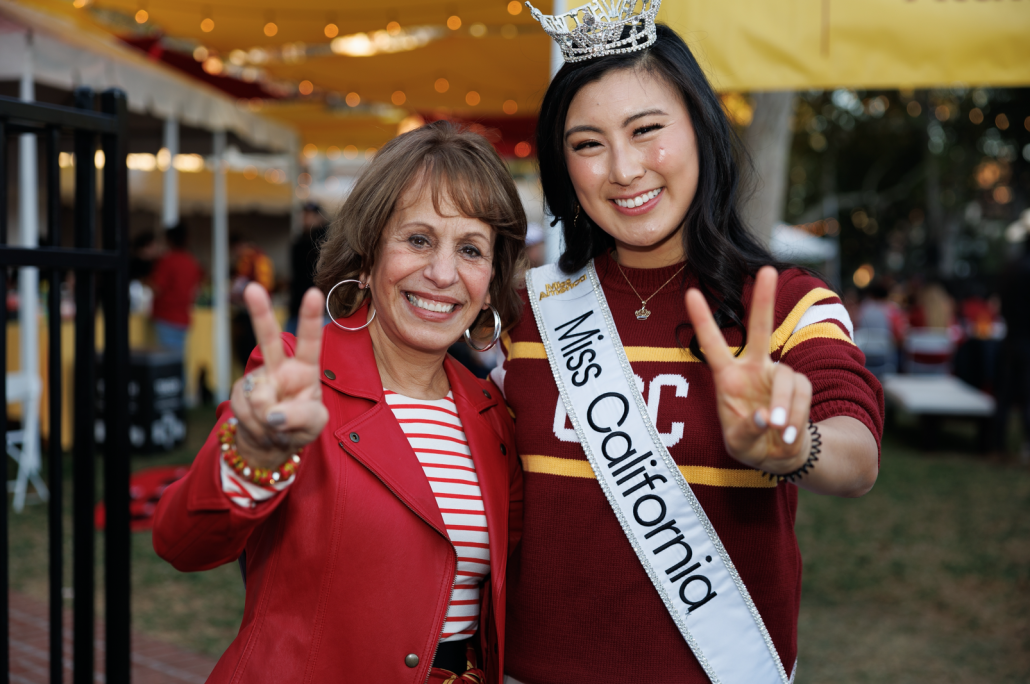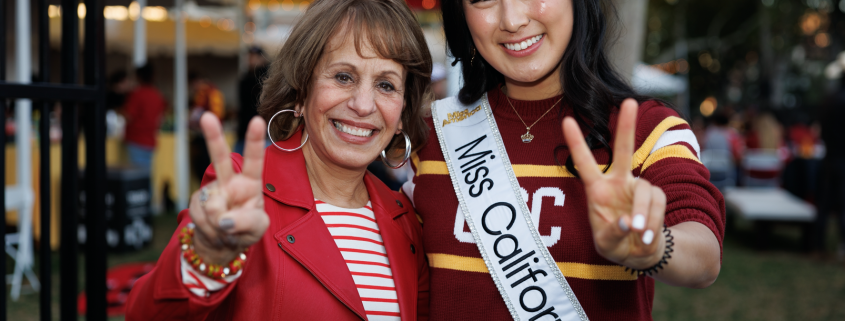Alumnae to compete at Miss America

When 51 women take the Miss America stage Dec. 15, only one can take home the crown. But two may be familiar faces for Trojans: Miss California Catherine Liang and Miss Hawaii Lauren Teruya are both Class of 2021 USC graduates.
Miss America began as a swimsuit competition in 1921, but has since evolved beyond a beauty pageant. Now, participants are judged on their speaking skills, social platform and onstage talent. The winner receives a $100,000 scholarship for higher education.
The crux of the Miss America competition is that each contestant must have a social justice platform. As Miss California and Miss Hawaii respectively, Liang and Teruya are already working on implementing their social platforms in their home states, with the hope of going national by winning Miss America.
Liang, who graduated with a degree in international relations and global business, chose the cause Champions of Courage to promote emotional intelligence workshops at schools and nonprofits.
“I am a big believer that … we face all of our own individual forms of fear, but it really is our reaction to it that defines either if we are someone who is defeated by it, or someone who comes out a champion,” Liang said.
Teruya, who graduated with a degree in journalism and theatre, is promoting Arts for All, which advocates for increased arts funding in schools. Teruya hosts community art workshops for children, encourages donations to teachers and works with Hawaii’s Department of Education to develop her own version of hopscotch influenced by pop culture.
This competition cycle is the first in a few years for Liang and Teruya. Liang took a break from pageantry after being diagnosed with Hashimoto’s disease, an autoimmune disorder, and losing her home in a wildfire.
“I felt like a complete newcomer, like I’m stepping back out of pageant retirement,” Liang said.
Before this competition season, Liang’s last title was Miss Los Angeles Chinatown in 2018.
Teruya first stepped into the pageantry world alongside her sister, Kathryn, who won Miss Hawaii in 2017. Kathryn said the pair did not grow up around pageantry, but it was a natural fit because of their love of performance.
“Once I got into it … I think [Lauren] saw the growth that I was able to have,to not only public speaking, but also the opportunity for service, and she kind of jumped on board with that too,” Kathryn said.
After Teruya’s tenure as Miss Teen Hawaii Teen USA, which she finished during her freshman year at USC, she was uncertain as to whether or not she would return to the competition circuit. Yet, Kathryn, along with Kira Dixon, Miss America 2015 and former classmate at the Annenberg School for Communication and Journalism, inspired her to keep going.
“I wasn’t really sure that this was the world for me. But when I saw the amount of dedication [Kathryn] had to put toward community, to service, to her impact, I wanted to take the time to do the same,” Teruya said.
Both women are surrounded by people working to help them reach their full potential inside and out of the competition. For Liang, that’s her self-described “Southern California momager,” Felita Wong Shen, who met Liang while Liang was the president of the Delta Phi Kappa sorority at USC and Wong Shen was the president of the sorority’s alumni association.
“It just made sense for me to be the person that was helping connect her to people and bring her to events and appearances,” Wong Shen said.
For Teruya, that person is Amos Kotomori, a local designer who mentors girls in pageantry during his free time.
“I’m basically the person that connects the dots,” Kotomori said. “I have resources that I can call on to help and assist with different things.”
The Miss America competition has a long cultural history. Russ Gladden, CEO of the Miss California organization, described growing up watching the Miss America pageant on TV.
“[It] was a big family event, not unlike what the Super Bowl is today,” Gladden said.
But in recent years, the excitement around the competition has cooled off. The #MeToo movement set off a series of scandals in the Miss America organization, beginning with then-CEO Sam Haskell resigning after his misogynistic emails, in which he derided past Miss Americas, were exposed.
“We are no longer a pageant; we are a competition,” the newly-appointed Miss America board chair Gretchen Carlson wrote in a statement after the email scandal. Carlson was ousted in 2019 after allegations that she created a toxic work environment, but the sentiment remained.
“I think pageants have really shifted,” Teruya said. “We honestly call them competitions now. We steer away from the word pageant, because it is more so about female role models and female leaders.”
In an effort to modernize the pageant in the wake of the internal turmoil, Miss America ditched the swimsuit portion of the competition in 2018. Television viewership of the pageant fell to an all-time low after the swimsuit competition was eliminated, prompting a switch to streaming in 2021. Frank Rexach, Liang’s career mentor, said Liang “embodies” modern pageantry.
“From what I understand [pageantry] to be, [it’s] much more around 360 of a person and more about the academic side and professional side rather than the beauty side,” Rexach said. “It’s a different day, time and place now, but I think someone like Catherine goes well beyond the platform of Miss America. She’s just been made stronger because of it, but it doesn’t define who she is.”
Competing in and winning Miss America isn’t just about holding a title. Both women and their teams emphasized the skills and opportunities that the competition creates.
“[Catherine is] really taking the opportunity of being Miss California and this platform to continue to advance her ambitions, which is really smart because she’s smart,” Rexach said.
Kotomori echoed a similar sentiment, saying the pageant is an opportunity for women to further their goals.
“I listen to really what their intention is, what their definition of winning is,” Kotomori said. “I look at their life ambition, where they are [now] and how I can help them get there.”
To both Teruya and Liang, competing in Miss America represents the culmination of years of pageantry.
“It’s about time I hang up the pads,” Liang said. “I really want to take this year and everything that I learned in terms of leadership, the ability to be an ambassador and a public speaker, and apply it to [my] career.”

